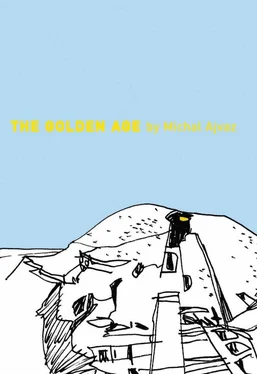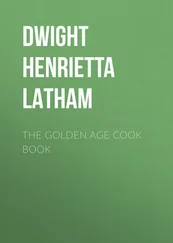Michal Ajvaz - The Golden Age
Здесь есть возможность читать онлайн «Michal Ajvaz - The Golden Age» весь текст электронной книги совершенно бесплатно (целиком полную версию без сокращений). В некоторых случаях можно слушать аудио, скачать через торрент в формате fb2 и присутствует краткое содержание. Год выпуска: 2010, Издательство: Dalkey Archive Press, Жанр: Современная проза, на английском языке. Описание произведения, (предисловие) а так же отзывы посетителей доступны на портале библиотеки ЛибКат.
- Название:The Golden Age
- Автор:
- Издательство:Dalkey Archive Press
- Жанр:
- Год:2010
- ISBN:нет данных
- Рейтинг книги:4 / 5. Голосов: 1
-
Избранное:Добавить в избранное
- Отзывы:
-
Ваша оценка:
- 80
- 1
- 2
- 3
- 4
- 5
The Golden Age: краткое содержание, описание и аннотация
Предлагаем к чтению аннотацию, описание, краткое содержание или предисловие (зависит от того, что написал сам автор книги «The Golden Age»). Если вы не нашли необходимую информацию о книге — напишите в комментариях, мы постараемся отыскать её.
is Michal Ajvaz’s greatest and most ambitious work.
The Golden Age
The Golden Age — читать онлайн бесплатно полную книгу (весь текст) целиком
Ниже представлен текст книги, разбитый по страницам. Система сохранения места последней прочитанной страницы, позволяет с удобством читать онлайн бесплатно книгу «The Golden Age», без необходимости каждый раз заново искать на чём Вы остановились. Поставьте закладку, и сможете в любой момент перейти на страницу, на которой закончили чтение.
Интервал:
Закладка:
Yet it was the case that narratives of mythology, fairy tale and adventure were more numerous than other kinds. Kings, princes and princesses, sorcerers, dragons and demons…all these things featured frequently. It seemed to me curious that the islanders should choose such a cast of characters. I long failed to understand how it was that they kept writing about all-powerful wizards when they themselves had no interest in power; why it was that they wrote about kings, princes and princesses when the island had no aristocracy and its king was miserable and impotent. They did not appear to be in the grip of nostalgia for a feudal past. It was also curious to me that many of the stories of the Book featured violent passions when apparently the islanders themselves knew no passion or desire.
Then it came to me that these mysteries were not as insoluble as they seemed. Let us not forget that the Book was an insertion which had emerged out of amorphousness; it was an exposition of formlessness, an interpretation of subtle murmurs and whirls. But an exposition of formlessness cannot itself be formless, fuzzy and soggy: there are bound to be clearly-contoured shapes behind it. We should not interpret the weak whirls of reality (which undulate with the primordial tremor out of which later we make time) as the feeble gurgitation of a torpid will, but as a story which evolves in a desire and a passion coagulating with other desires and passions. To close in on the formlessness and forms the Book describes, bold gestures, pictures and stories were required; the nascent stories summon heroes — kings, generals and wizards — who have a power which enables them to the utmost extent to act, react and reign. The casts of aristocrats are in no way an expression of a conscious or unconscious desire for a hierarchical society: they are a means of ensuring the gyratory progress of the Book . As naturally the authors have no knowledge of such heroes and motifs from their own experience on the island, they seek them out in dispatches from our world delivered by visitors to the island. The Book is not a treatment of the islanders’ world but of ours; it is an ever-changing island dream of our world.
Whenever I came across characters and situations in the Book that were familiar to me from fairy tales, I found myself eagerly anticipating magical, poetic and fantastical images; in this I was always disappointed. Individual stories were governed by a strange mechanics which was only for show. The plot of a story often revolved around the need to solve some kind of task, and the characters performed this by either trying to construct a suitable mechanism or to find a natural phenomenon (animal, vegetable or mineral). In spite of their fairy-tale settings and magical props, the stories were reminiscent of mathematical equations or the assembly of complex machines. And as stories were entered at many levels and folded in on themselves, the Book behaved towards the intrepid reader as a monstrous machine with no function but many levels of cogged gearwheels.
At the station in Vršovice
Now, dear reader, is perhaps the time for me to present you with a story from the Book . I still don’t have much taste for this, and I have to admit that yesterday after I finished work on the last chapter I spent the entire afternoon walking the streets of Pankrác, Michle, and Vršovice. The spring mist was so fine that I could barely distinguish it from the foretaste of rain; I was bombarded with hundreds of different reeks and scents (I’m writing these chapters at the end of April). I was considering the pros and cons of embarking on the most pointless undertaking yet in the setting down of my recollections of the island. I was tempted by the thought of ending my writing here and now, thus leaving the stories of the Book to your imagination, not least because I realized I couldn’t remember that much about them and would have to piece them together from disconnected fragments, or else think up new connections. But I reached the conclusion that it would be unfair of me to wriggle out of this task; besides, as transformations of the text were part and parcel of the Book , would not a narrative transformed by forgetfulness and patched-up fantasy be truer to the Book than an exact representation of the Book as I knew it during my days on the island?
I was yet more afraid of the Book ’s peculiar tendency to uncontrollable proliferation and expansion. I knew the Book well enough to realize that it was unlikely that the long period it had spent in a remote part of my brain had sufficed for its deactivation. I knew that once I began to bring extracts from the Book out into the light I would need to proceed with the caution of an experienced pyrotechnician — without careful handling any of them could explode, spraying over a wide area contents hitherto hidden. The light-minded narrator might have chosen a chapter from the Book and then found himself at the centre of a blast, with pages raining down on him by the hundreds.
But then I reached a point at which the dangers of the Book took on the aspect of a game of adventure — I told myself it would be cowardly to shirk the challenge this presented. I have some experience of the Book , after all; I know its tricks, where its dangers lie, the signals it gives, and to pay these due attention. I reached my decision as I was walking past the station at Vršovice. Since I like this place I went inside, bought myself some coffee in a plastic cup, went out on to the platform and sat down on a bench that rested against the wall of the station building. I watched the trains come and go and imagined you, dear reader, reading the tales of my travels. I wondered which part of the Book I should narrate from. As I have said, the texts that fight free of the Book ’s pockets are from many different genres. Initially I thought of recounting what I could remember of the sections of the Book which seemed to me the most original. These were texts which had something in common with abstract painting, long passages in which no people, animals, plants or even objects appeared; the heroes of these passages were various kinds of smudges or stains, of which I have spoken in an earlier chapter. The islanders gave these smudges or stains special names. Admittedly, these texts are not exactly typical of the Book —the main motion present in the Book is a sweeping gyration in which formlessness gives way to form and vice versa. The stories of stains circulate only in a small wheel, in which the shapes brought forth do not trouble the material world.
These passages describe in detail how stains transform, how their positions change in an abstract two-dimensional space, and how the relations between these stains change. For example, one insertion describes over dozens of pages how the stain puo sprouts two nest protrusions (have I mentioned already that it is not only stains that have names but also parts of stains?) and how in time the ends of these stains begin to curl in towards each other. For a while all the indications are that the protrusions will join up, thus creating a rare kind of stain containing an island void, but as the protrusions appear to be about to meet, their progress is halted and they remain separate. From time to time — as if by way of contrast — a small stain approaches one of the protrusions, but it never gets close enough to bring any kind of influence to bear on the larger stain. So what is the shape to which the main stain aspires? The islanders find this kind of narrative quite thrilling; they devour it as we devour detective stories. If the island had television, the islanders’ equivalent of Dallas or Dynasty would probably be a daily episode of a never-ending series on the transformation of stains.
Читать дальшеИнтервал:
Закладка:
Похожие книги на «The Golden Age»
Представляем Вашему вниманию похожие книги на «The Golden Age» списком для выбора. Мы отобрали схожую по названию и смыслу литературу в надежде предоставить читателям больше вариантов отыскать новые, интересные, ещё непрочитанные произведения.
Обсуждение, отзывы о книге «The Golden Age» и просто собственные мнения читателей. Оставьте ваши комментарии, напишите, что Вы думаете о произведении, его смысле или главных героях. Укажите что конкретно понравилось, а что нет, и почему Вы так считаете.












